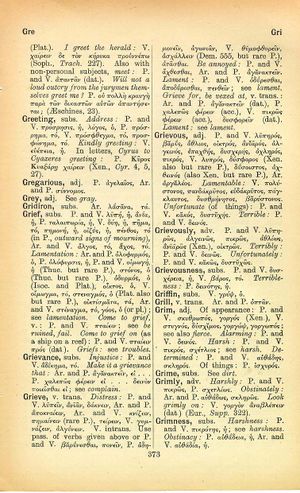grief
ἐὰν ταῖς γλώσσαις τῶν ἀνθρώπων λαλῶ καὶ τῶν ἀγγέλων, ἀγάπην δὲ μὴ ἔχω, γέγονα χαλκὸς ἠχῶν ἢ κύμβαλον ἀλαλάζον → though I speak with the tongues of men and of angels and have not charity I am become as sounding brass or a tinkling cymbal
English > Greek (Woodhouse)
substantive
P. and V. λυπή, ἡ, ἀνία, ἡ. P. ταλαιπωρία, ἡ, V. δύη, ἡ, πῆμα, τό, πημονή, ἡ, οἰζύς, ἡ, πένθος, τό (in P., outward signs of mourning), Ar. and V. ἄλγος, τό, ἄχος, τό.
lamentation: Ar. and P. ὀλοφυρμός, ὁ, P. ὀλόφυρσις, ἡ, P. and V. οἰμωγή, ἡ (Thuc. but rare P.), στόνος, ὁ (Thuc. but rare P.). ὀδυρμός, ὁ (Isoc. and Plato), οἶκτος, ὁ, V. οἴμωγμα, τό, στεναγμός, ὁ (Plato also but rare P.), οἰκτίσματα, τά, Ar. and V. στέναγμα, τό, γόος, ὁ (or pl.); see lamentation.
come to grief v.: P. and V. πταίειν; see be ruined, fail.
come to grief on (as a ship on a reef): P. and V. πταίειν πρός (dat).

